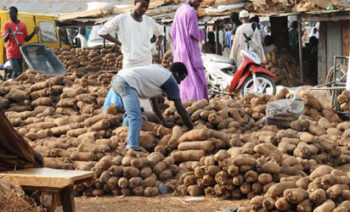
Chairman, Technical Committee on Nigeria Yam Export Programme, Prof. Simon Irtwange, says the exportation of yam will not affect local consumption of the produce and its price.
Irtwange gave the assurance in an interview in Lagos on Friday.
He said that it was necessary to allay the fears of the citizens that yam would soon become scarce and costlier because of its export.
He said that the technical committee has developed an action plan to meet the demands for export and local consumption of yam.
“The export of yam will serve as incentives for more yam production and we are developing schemes to ensure that.
“It is not every tuber of yam that has export quality and it is not also every tuber that meets export standard.
“For export, particular weights and sizes of yam are required.
“Farmers are learning how to separate export and non-export quality yams.
“Yams with no export quality will be left for local consumption or taken to factories to be processed into flour and yam chips, among others,’’ he said.
The professor, however, said that it was virtually impossible to buy yam at uniform prices all-year-round.
“We all know that at harvest, yam is cheaper and 100 tubers of yam can go for N10, 000.
“However, six months after, the same 100 tubers will go for N35, 000,’’ he said.
According to him, price stability is not possible with agricultural produce, as the prices often go up long after harvests.
Irtwange said that the yam export initiative would create jobs and reduce unemployment, while boosting the incomes of farmers who had been suffering all these years.
He said that youths would also have incentives that would make them go into yam production.
Irtwange said that the yam export programme would be private-sector driven; adding that once all relevant government agencies provided the enabling environment, export and local consumption of yam would not suffer.
He said that instead of local consumption, yam export would be more affected, as yam had to be exported under strict conditions.